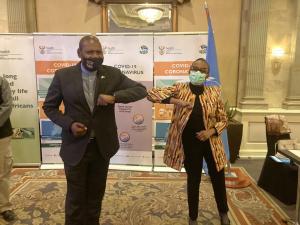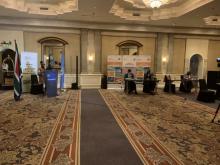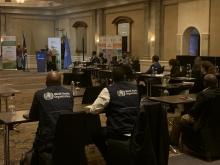WHO Regional Director introduces Surge Team of Experts to South African Government
The Regional Director of the World Health Organization (WHO) for Africa, Dr Matshidiso Moeti, on 14 August introduced the first phase of the surge team of WHO health experts, deployed to support South Africa's COVID-19 response management, to a high-level delegation from the government.
The experts were welcomed at a reception which included WHO Director-General Dr Tedros Ghebreyesus (virtually), South African Minister of Health Dr Zweli Mkhize, Deputy Health Minister Dr Joseph Phaahla and Director-General of health, Dr Sandile Buthelezi as well as the WHO Country Representative Dr Owen Kaluwa and Resident Coordinator of the UN in South Africa, Ms Nardos Bekele-Thomas.
The first 17 of a total team of 43 experts, arrived on 5 August 2020 while the remaining team starts work in the coming days. The team includes Executive Director of the WHO Health Emergencies Programme Dr Mike Ryan and renowned public health expert and epidemiologist Dr David Heymann,who will provide virtual support, as well as experts in epidemiology, surveillance, case management, infection, prevention and control, procurement and community mobilization.
Earlier in the day, the surge team was given a comprehensive orientation by a range of key players involved in the range of responses to the pandemic in South Africa.
The team will work closely with the Department of Health at national level and with senior staff of Provincial Departments of Health.
Dr Moeti said South Africa is the country most affected in the African Region by the COVID-19 pandemic – accounting for over 60% of all deaths and cases in the Region.
“However, things could have been much worse. The initial epidemiological models projected a much higher burden of cases, and this has been averted through the Government’s quick and decisive actions, which have helped to slow the spread of the virus and bought time to strengthen public health capacities.
“I would like to commend the South African Government for the exemplary leadership in the COVID-19 response,” she said.
“We must anticipate that this virus is likely to stay with us for some time. We therefore need to learn to live safely with COVID-19, by minimizing risks and reacting quickly and comprehensively to flare-ups,” said Dr Moeti, adding that those involved in tackling the pandemic must not lose focus on other pressing health needs, particularly the continuity of essential health services.”
In his address, Dr Mkhize said South Africa shares a long and rich kinship with WHO, citing a number of instances where WHO had heeded the country's call for support in public health emergencies.
“South Africa is truly blessed to have this calibre of expertise in its midst as we continue to be at war with the Coronavirus. The significance of this bond has never been more highlighted than during this cataclysmic period of our era,” he added.
“As political volatility escalates around the world, it is very telling that during our time of most need, we did not hesitate to call on WHO to bolster our efforts and they did not hesitate to respond to that call.”
Responding to queries that there is not a need for a surge team if South Africa is past the surge, Dr Mkhize said: “We are not past anything; we are still the country with the fifth highest positive cases in the world …
“Apart from its impact on the health system, we are still faced with the devastation this virus has caused in our social lives, our well being, the economy and the environment. With the threat of resurgence remaining very real, we would not want to repeat recent history witnessed in some countries and allow a second surge to wreak even further destruction.”
Dr Tedros Ghebreyesus said WHO's long-standing cooperation with South Africa on a range of issues from HIV to maternal health to universal health coverage gives the organisation a firm grounding to work together on this latest challenge.
“Now is not the time to let our guard down. As public and social distancing measures are lifted, it is critical we remain vigilant,” he said. “By working together in solidarity, we can bring this pandemic under control.”





